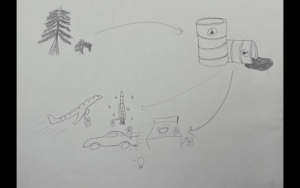What I aimed to depict to the aliens is not exactly a human invention, but a human discovery that led to the invention of many of the things on earth that we as humans take for granted today.
While the usage of fossil fuels today is frowned upon as we look for more renewable sources to sustain our constantly growing energy consumption, it is important to remember and acknowledge that the discovery of crude oil was one of the biggest moment’s in human history. It began the shift from a coal based economy to an oil one. From how we navigate our planet to how we cook our food, the majority our homes and vehicles run on oil. The energy plants that generate our electricity also run on fossil fuels such as oil. We use it to lubricate machinery and in plastics that we use every day. The extend to which we rely on crude oil is massive, and if any alien civilization wanted to know what of the keystones of our society today, oil would be one of the first things that I would introduce to them.
In my plaque, which is read in a circle starting from the top left and flows clockwise, I start with a depiction of plant life. Specifically a fern and a Wollemi pine tree, which are both plants that grew and existed during the Mesozoic era. Over time plants like these compress underground into peat and eventually into oil. This process takes millions of years, but given the Heptapods’ uniform perception of time, it doesn’t really matter. What matters is the process.
The next part that I depict is a couple of barrels of oil. I kept this pretty straightforward but also visually explicit. The plant life turns into black gold over huge stretches of time and encase it, making it ready for use in all sorts of things.
The final piece shows a moving car, a leaving airplane, a rocket taking off, a lightbulb, and a stove with a steak on it. This is to show them how much of what we do depends on the usage of oil. It powers our homes and fuels our expansion into the stars. Without it, we might not have made it to where we are today. 